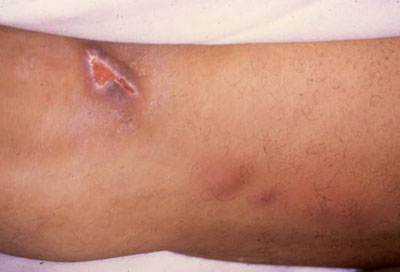Last reviewed: 7 Oct 2024
Last updated: 09 Jun 2023
Summary
Definition
History and exam
Key diagnostic factors
- fever
- lymphadenopathy
- painful skin ulcer
- unilateral conjunctivitis
Full details
Other diagnostic factors
- headache
- malaise/fatigue
- myalgia
- anorexia
- abdominal pain
- vomiting
- rales
- nonproductive cough/dyspnea
- sore throat
- photophobia
- vision impairment/loss
- jaundice, hepatosplenomegaly, diarrhea
- positive Kernig/Brudzinski sign, stiff neck
Full details
Risk factors
- tick exposure
- biting fly exposure
- contact with infected animals
- yard work in areas where infected animals live
- spring or summer season
Full details
Diagnostic tests
1st tests to order
- CBC
- serum electrolyte levels
- LFTs
- serum creatine kinase
- urine dipstick for blood
- erythrocyte sedimentation rate
- serology
- blood culture
- specimen culture
- polymerase chain reaction (PCR) of ulcer swab or lymph node aspirate
Full details
Tests to consider
- chest x-ray
- lumbar puncture
- histopathology
Full details
Emerging tests
- antigen detection in urine
Treatment algorithm
ACUTE
tularemia without meningitis
tularemic meningitis
Contributors
Authors
William A. Petri, Jr., MD, PhD, FACP

Wade Hampton Frost Professor of Epidemiology
Professor of Medicine, Microbiology, and Pathology
Chief, Division of Infectious Diseases and International Health
University of Virginia
Charlottesville
VA
Disclosures
WAP declares that he has no competing interests.
Peer reviewers
Christopher Huston, MD
Assistant Professor of Medicine
Division of Infectious Diseases
University of Vermont College of Medicine
Burlington
VT
Disclosures
CH declares that he has no competing interests.
Beth Kirkpatrick, MD
Assistant Professor
Infectious Diseases
University of Vermont College of Medicine
Burlington
VT
Disclosures
BK declares that she has no competing interests.

Differentials
- Tularemic bacteremia
- Cat scratch disease
- Toxoplasmosis
More DifferentialsGuidelines
- Tickborne diseases of the United States: a reference manual for health care providers
- Practice guidelines for the diagnosis and management of skin and soft tissue infections
More GuidelinesLog in or subscribe to access all of BMJ Best Practice
Use of this content is subject to our disclaimer